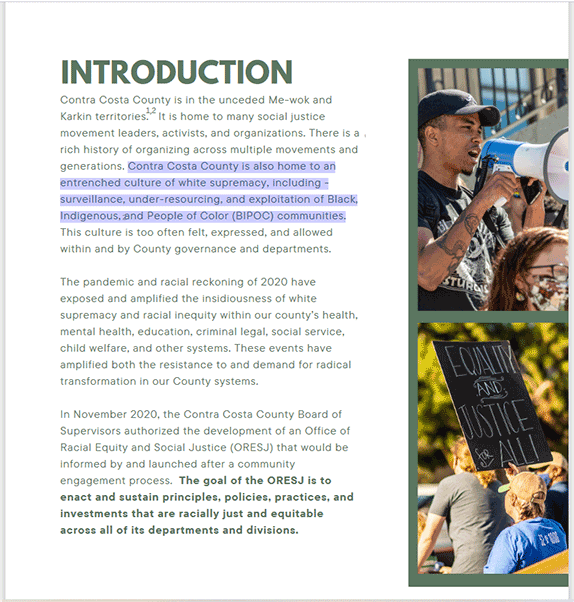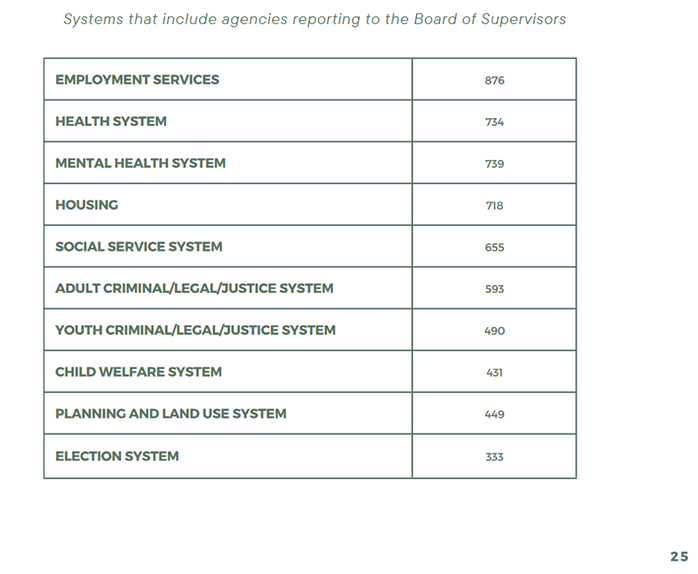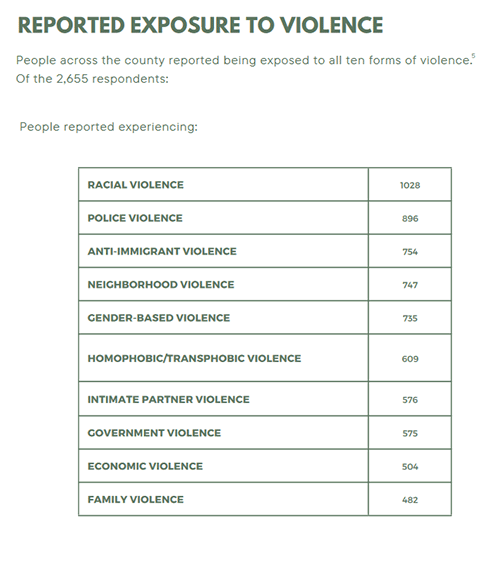On Tuesday, the Contra Costa County Board of Supervisors will receive a report and recommendations related to the establishing of a new County department titled the “Office of Racial Equity and Social Justice”.
The county is proposing a cost of fiscal year 2022-23 $600,000 in Measure X funding, and $1.2 million in Fiscal year 2023-24.
On November 10, 2020, the Board of Supervisors accepted the concept proposal by Supervisors Federal Glover and John Gioia to establish a Contra Costa County Office of Racial Equity and Social Justice (ORESJ). The Board also authorized the immediate launch of a Community Planning Process consistent with the Proposed Community Planning Process Document presented to the Board of Supervisors. This process was funded by foundations and businesses.
Here is the introduction to the 53-page report:
INTRODUCTION
Contra Costa County is in the unceded Me-wok and Karkin territories. It is home to many social justice movement leaders, activists, and organizations. There is a rich history of organizing across multiple movements and generations. Contra Costa County is also home to an entrenched culture of white supremacy, including -surveillance, under-resourcing, and exploitation of Black, Indigenous, and People of Color (BIPOC) communities. This culture is too often felt, expressed, and allowed within and by County governance and departments.
The pandemic and racial reckoning of 2020 have exposed and amplified the insidiousness of white supremacy and racial inequity within our county’s health, mental health, education, criminal legal, social service, child welfare, and other systems. These events have amplified both the resistance to and demand for radical transformation in our County systems.
In November 2020, the Contra Costa County Board of Supervisors authorized the development of an Office of Racial Equity and Social Justice (ORESJ) that would be informed by and launched after a community engagement process. The goal of the ORESJ is to enact and sustain principles, policies, practices, and investments that are racially just and equitable across all of its departments and divisions.
Notably, Contra Costa County is the first jurisdiction to develop and launch an office through a community engagement process, not vice versa. Supervisors John Gioia and Federal Glover are leading and stewarding this initiative with the Board of Supervisors and County.
Additionally, resources for the community engagement process were procured through local philanthropic partners, not County dollars. Though it may seem counter to the efforts and need for County investment and infrastructure, this was an intentional strategy to ensure deep and broad community engagement. County dollars would have tethered us to the pace and deliverables of the system, not the pace of the community. We leveraged philanthropic dollars so that we could take the time needed and deserved to gather, listen, inquire, and reveal a truer and fuller picture of what resources are needed for the ORESJ to achieve its intended aims.
Throughout this process, we have remembered and reminded ourselves and each other that public and philanthropic resources already belong to our communities. Our collective responsibility is to ensure just (re)distribution and allocation of all our resources, whichever coffers they sit in.
FULL REPORT – 53 pages – click here
According to the report, they held over 40 listening sessions with over 400 participates throughout the county.
They also conducted 2,655 surveys from the community – the breakdown includes 907 (West Contra Costa), 608 (Central Contra Costa), 502 (South Contra Costa) and 367 (East Contra Costa).
REPORTED SYSTEM HARMS
People across the county reported being harmed by all thirteen of the systems listed in the survey. An open-ended question allowed people to describe the harm that they experienced. The four most common forms of harm are reported below:
- 21% of respondents reported not having access or the resources to receive a service
- 19% reported racial discrimination
- 10% reported being physically or emotionally harmed
- 8% reported inadequate or poor treatment from the staff
Most of these systems are departments within county governance. We separated findings related to systems reporting to the Board of Supervisors from those that do not. Of the 2,655 respondents, people reported being harmed by:
Office Priorities:
The survey asked whether priorities that were raised in focus groups were also priorities for people responding to the survey.
How should the Office do its work?
- Community Engagement: 1,301 people
- Advocacy: 1,019 people
Harms
- Criminal and Legal System: 1,262 people
- Education System: 1,097 people
Needs
- Healing: 1142 people
- Food Access and Justice: 1142 people
- Youth Development and Engagement: 980 people
- Reparations: 886 people
- Housing: 838 people
- Arts and Culture: 573 people
The committee & Funders
This report has been prepared by the Core Committee of ORESJ that included the following people: Kimi Barnes, Solomon Belette, Donté Blue, Sonia Bustamante, Kanwarpal Dhaliwal, Teki Flow, Roxanne Carrillo Garza, Angela Irvine, Isabel Lara, Jen Leland, Kerby Lynch, Latrece Martin, Mariana Moore, Karen Perkins, Jose Rizo, Ali Saidi, Willie Robinson, and. Past members also include Victoria Adams, Gigi Crowder, and Susun Kim
We thank the following funders who invested in the ORESJ Community Engagement Process: The CA Endowment, The Contra Costa Regional Health Foundation, Dean and Margaret Lesher Foundation, The East Bay Community Foundation, John Muir Community Benefits, John Muir Health Foundation, RCF Connects, Republic Services, San Francisco Foundation, YH Soda Foundation, Zellerbach Foundation
Contra Costa County Board of Supervisors Meeting
9:00 am on October 25




1 comment
Be careful where this lead
Comments are closed.